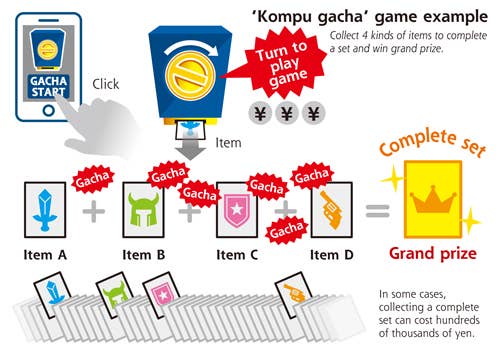Gree, DeNA stocks plunge as Japanese government cracks down
Japan's Consumer Affairs Agency says certain game mechanics are illegal
The stock of both leading Japanese mobile social game companies dropped over 20 percent today following comments from Japan's Consumer Affairs Agency that a key game mechanic is in violation of the law. Other Japanese game companies that use the mechanic, including Konami and Capcom, also saw significant stock declines. Gree's founder, Yoshikazu Tanaka, lost over $700 million yesterday because of Gree's 23 percent plunge in stock value.

The game mechanic in question is known as "kompu gacha" (complete gacha). Gacha is a game mechanic based on the coin-operated toy vending machines you find everywhere in Japan; it's essentially a lottery spin to get a virtual item. Nearly every game from DeNA and Gree use the "gacha" mechanic, as do games like PopCap's Bejeweled Blitz. With the "complete gacha" players who want to get a special/rare item must get a set of other items through gacha first. For instance, the user must first get item A through gacha, then item B (also through gacha), then C and D - and only if they can get items A-D (complete gacha) do they get the rare item.
This leads to users spending an inordinate amount of money to get extra "gacha" chances, which has already led to some crackdowns by Japan's Consumer Affairs Agency and an agreement by Gree and DeNA to limit spending by children. Apparently this has not gone far enough for the Japanese government, which has seen the number of complaints soar.
The Yomiuri Shimbun reported that the agency will ask social-network game operators to stop using the system because it prompts customers to pay excessive fees. One user racked up over ¥4 million (over $50,000, or £30,000) in charges in just two months. Typically one gacha play costs ¥300.
Konami's stock dropped 18 percent on the news; Namco-Bandai's stock declined 9.5 percent, and Capcom's stock fell by 6.6 percent. "The market for social games may shrink if the warning is issued," said Makoto Sengoku, a Tokyo-based market analyst. "This would ruin profit pillars." A ban on the complete gacha game mechanic could reduce Gree's net income by 18 percent and DeNA's by 6 percent, according to David Gibson, a Tokyo-based analyst at Macquarie Securities Ltd.
"At this point, only one of two key areas that are currently under fire is being taken care of," said Dr. Serkan Toto, an expert on the Japanese social gaming market. "I wouldn't be surprised to see the government crack down on gacha once again (for example by forcing game providers to display the probability of getting certain cards), or (which is more likely) push the industry to get the real-money trading phenomenon of virtual items under control."
Neither DeNA nor Gree had any immediate comment on the matter. This could substantially affect the growth of the mobile social games market in Japan, with possible ripple effects elsewhere.

